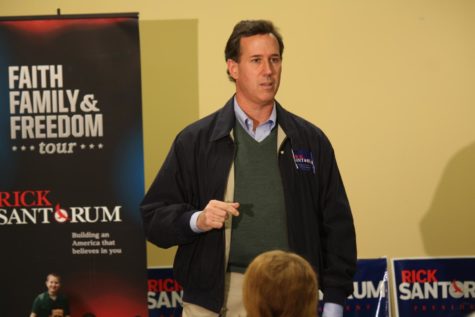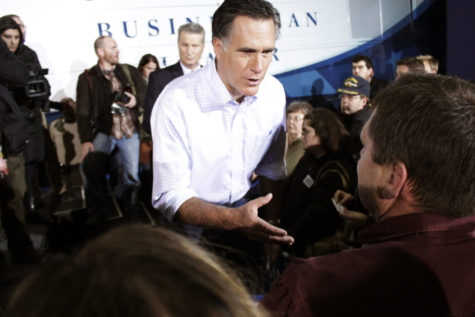Candidates embrace social media with varying degrees of success
June 1, 2011
During the 2008 election, Barack Obama dominated new media by reaching supporters through his use of email, social-networking sites and texting. Now, Republican Mitt Romney has launched a new application for the iPhone and Android.
Romney’s application costs just 99 cents and is designed for followers of Mitt Romney. The application includes news about Romney, quotes and trivia.
2008 was a landmark year for the use of new technology in elections. According to the Pew Research Center, 36 percent of voters used the internet as their main source of election information in 2008. According to the same study, 65 percent of voters between the ages of 18 and 29 watched campaign videos online. However, only 8 percent of voters used Facebook or MySpace to find information about the 2008 election.
Social networking, smartphones and other new technologies provide multiple ways for voters to stay aware of the latest information.
“Modern media is growing more and more with every election. It is becoming simply a major way to communicate with potential supporters,” said Jim Hutter, associate professor of political science.
But the use of modern media is difficult to monitor.
“There are no real markers,” Hutter said. “There are no campaign expenditures to track for Facebook use.”
The only ways to track the use of modern media are through the number of application users, page followers, channel followers and fans. This does not account for the amount of time a campaign may or may not have spent developing the application, page or video.
The use of nontraditional media is not just limited to the Web. In 2004, John Edwards announced his candidacy for president on “The Daily Show.” Shows such as “The Daily Show” and “The Colbert Report” have increasingly become sources of information for voters.
While critics of new media may think these developments oversimplify the news, a study by the Annenberg Public Policy Center of the University of Pennsylvannia found that viewers of “The Daily Show” knew more about world events than nonviewers regardless of their party identification, education level or other news sources consulted.
According to a 2008 study by the Pew Research Center, viewers of “The Daily Show” scored in the “highest percentile on knowledge of current affairs.”
Thus far, application of social networking, YouTube, and other new technologies has mostly been limited to national campaigns. Some state elections, such as Roxanne Conlin’s 2010 campaign, have used modern media in Iowa.
“It starts at the top,” Hutter said. “Technology appears. Expertise and use grow and eventually spread.”
During the 2008 presidential election, Democrats dominated modern media use. Barack Obama, Hillary Clinton and John Edwards all had YouTube channels with thousands of subscribers.
Republican candidate Ron Paul was also a YouTube success, attracting more subscribers than Barack Obama and Hillary Clinton combined. However, other Republican candidates struggled to communicate via YouTube or Facebook. Mike Huckabee, winner of the 2008 Iowa Republican Caucus, did not have a YouTube channel.
In 2008, Mitt Romney had 41,479 Facebook supporters. Thus far in 2011, Mitt Romney has 935,959 Facebook supporters, and he has yet to announce his candidacy.
The 2012 election has already begun to see an increase in the use of modern media by Republican candidates. Mitt Romney’s iPhone and Android apps are one indication of a shift in the way campaigns reach supporters directly.
Applications are available for the iPhone and the Android that provide information for the 2012 election. 2012 U.S. Election is a free app that counts down the days left before the election. More sophisticated apps, such as Election 2012, provide election maps, news, and other features. The latter application gives users the ability to play with the electoral map and see various outcomes.
The use of modern media is changing communication for campaigns during elections. In 2008, Barack Obama successfully dominated alternative media. Republicans are wasting no time in playing catch-up. Alternative media will prove to be an interesting battleground in 2012.








